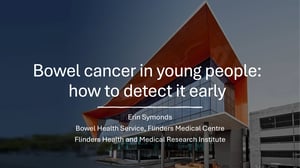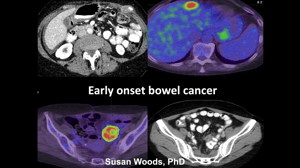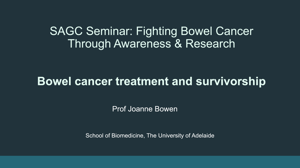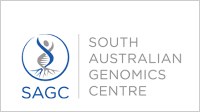From the Ledge to the Lab: Fighting Bowel Cancer Through Awareness & Research
On Wednesday 27 August 2025, the South Australian Genomics Centre and Flinders Foundation hosted — From the Ledge to the Lab: Fighting Bowel Cancer Through Awareness & Research — bringing together leading researchers and a passionate audience to explore the latest in bowel cancer science, prevention, and care.
Held at the SAHMRI Auditorium, the event spotlighted the important role that public awareness and early detection can have on outcomes from bowel cancer — a disease that is highly curable when caught early, and yet still leads to more than 6,000 deaths each year in Australia.
With increasing rates of bowel cancer among younger adults, particularly women, the discussion was both timely and deeply relevant.
🎥 Watch the Seminar Series

A/Prof. Erin Symonds
Bowel cancer in young people: how to detect it early
Erin discussed her team’s work in developing sensitive, non-invasive biomarkers and tools for colorectal cancer (CRC) screening, including programs like SCOOP for high-risk individuals.
- 98% of cases can be treated successfully, if found early
- Bowel cancer can be prevented by removing the adenomas
- The mortality rate from bowel cancer is reducing
- The number of cases is reducing

Improving Outcomes for Aggressive Bowel Cancers
Increasing Incidence and Mortality in Younger Australians:
- Of the roughly 15,000 Australians diagnosed each year with CRC, ~11% are under 50 years of age.
- Those born in the 90’s have 3-4x higher risk than those born in the 40’s. Many theories, but we don’t have a good explanation.
- Australia has the highest incidence of early-onset CRC, which is the leading cause of death in Australians aged 25-44.
- Most young-onset CRC cancers are diagnosed at a late stage due to missed diagnoses.
Susan shared how her lab is using advanced preclinical models and patient-derived samples to develop early detection tools and personalised treatment approaches — including the role of the microbiome in risk and response. Her work focuses on CRC patients with the worst prognosis. Leading the first prospective study where organoid drug responses were used to guide treatment choice for select end-stage patients.
Box Description

A/Prof. Susan L. Woods
Susan is a biomedical scientist with three first-author Nature papers. Her lab, supported by NHMRC and Beat Cancer SA funding, focuses on improving outcomes for aggressive bowel cancers. Using patient samples and advanced preclinical models, her team develops new screening tests for early, hidden cancers and explores personalised treatment strategies to better match therapies to individual patients. The lab also studies how gut bacteria contribute to cancer, with the goal of creating probiotic-based tools for detection or prevention in high-risk individuals.
https://researchers.adelaide.edu.au/profile/susan.woodsBowel cancer treatment and survivorship
Joanne presented on her group’s work to determine better strategies for managing the side effects of cancer treatment. Common side effects in bowel cancer treatment involving chemotherapy are oral ulcers, diarrhoea, fatigue and nerve damage. While some side effects are acute during treatment, others like neuropathic pain, can last years and effect many aspects of life. Joanne’s team is investigating the therapeutic effect of transcranial magnetic stimulation (TMS) and exercise in alleviating these often debilitating symptoms.
Box Description

We Took the Plunge!
On Friday, August 29th, the SAGC Team and Assoc. Prof. Michael Michael (SAGC Steering Committee Member) Flinders Medical Centre, braved gale-force winds to abseil down the Intercontinental Hotel. We sincerely want to thank everyone (friends, family and colleagues) who contributed toward us hitting our goal of $6,000 for cancer research.
Box Description







.png?width=300&name=Bowel%20Cancer%20Seminar%20(1).png)
